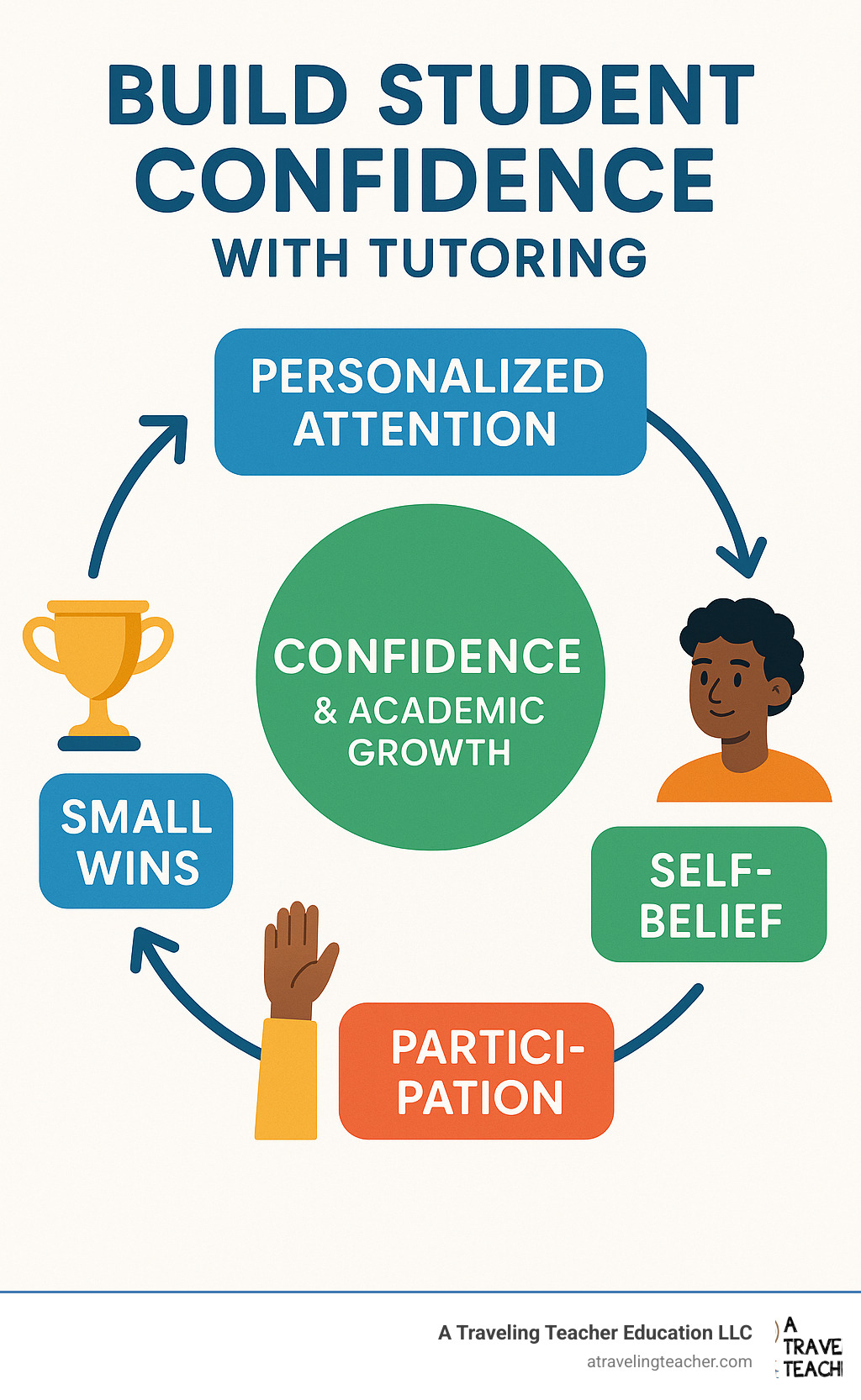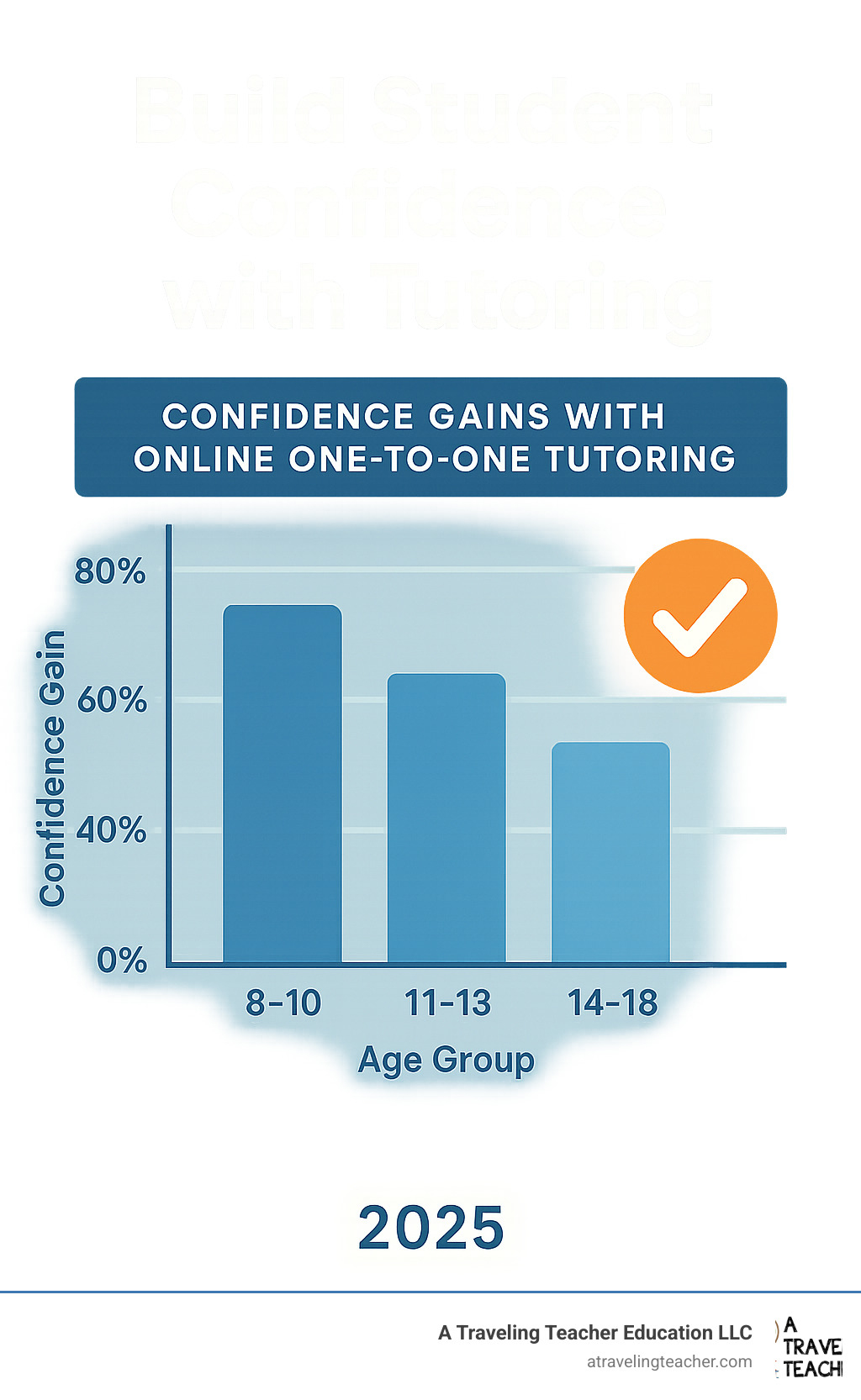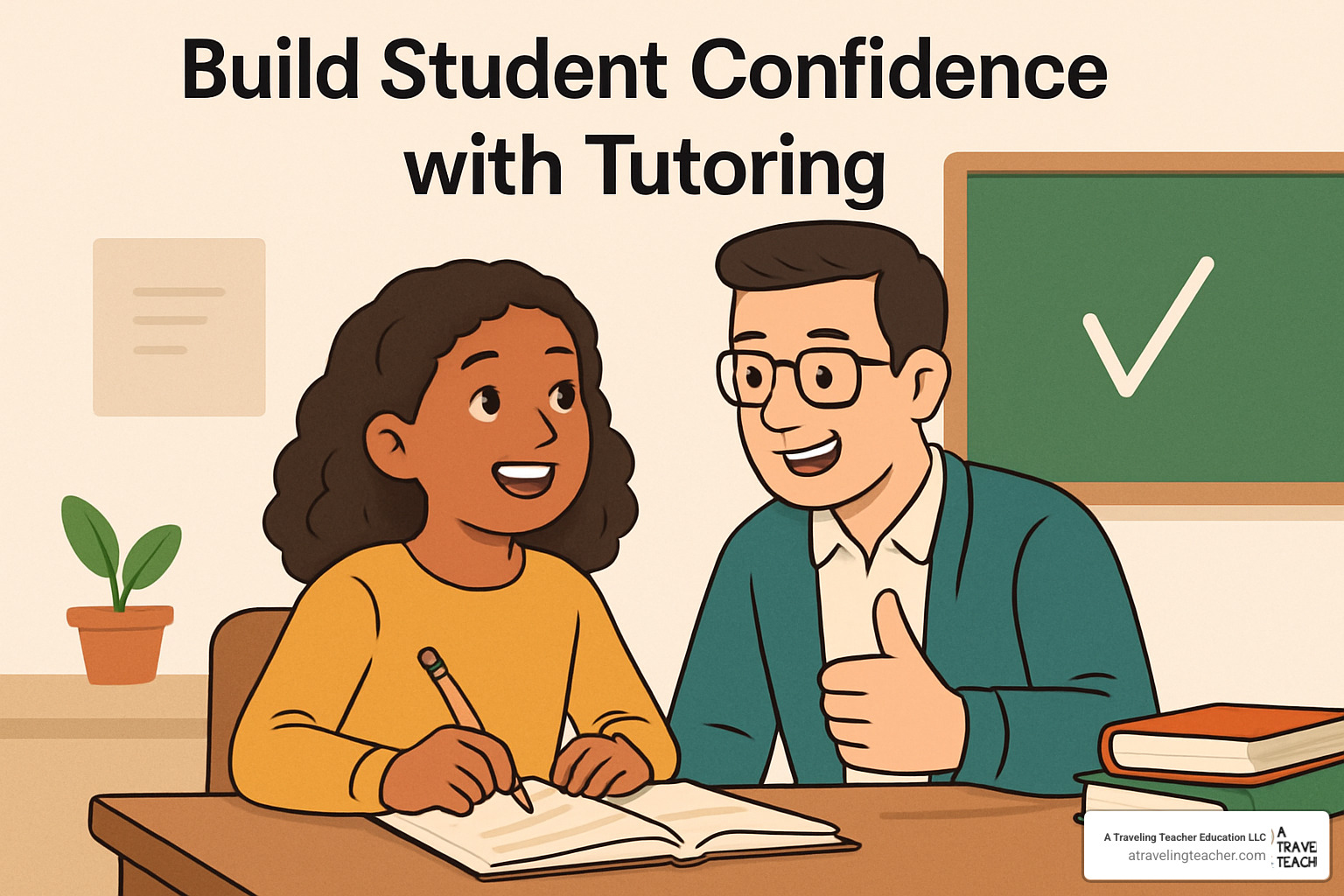
Why Building Student Confidence Through Tutoring Changes Everything
Build student confidence with tutoring and you’ll open up something far more powerful than just better grades. When students believe in their abilities, they participate more actively in class, tackle challenging problems, and develop the resilience needed for lifelong learning success.
Quick confidence-building strategies that work:
- Create a safe space where mistakes become learning opportunities
- Use positive reinforcement to celebrate small wins and effort over outcomes
- Provide personalized pacing so students master concepts without feeling rushed
- Offer specific feedback that focuses on the task, not the person
- Set achievable milestones that build momentum toward bigger goals
The research backs this up. Studies show that 90% of students who increased their confidence also improved their grades, while 82% of primary school children reported increased confidence after one-on-one tutoring sessions. Even more impressive: after just eight weeks of personalized tutoring, children with high math anxiety were 20% less anxious about the subject.
This isn’t just about academic performance—it’s about changing how your child sees themselves as a learner. When a frustrated student says “I need help with my math. I don’t know what to do,” they’re not just asking for content support. They’re asking for someone to help them believe they can succeed.
I’m Peter Panopoulos, and after 8+ years teaching middle school math in Massachusetts, I’ve seen how the right approach can build student confidence with tutoring in ways that transform entire academic trajectories. Through A Traveling Teacher, our team of licensed educators now helps families across Massachusetts create these confidence-building moments through personalized online tutoring that meets students exactly where they are.

Why Confidence Is the Hidden Driver of Academic Success
Here’s something that might surprise you: academic confidence isn’t just a nice bonus—it’s actually the secret ingredient that determines whether your child will thrive or struggle in school. When students believe they can succeed, something magical happens. They start raising their hands more often, asking questions when they’re confused, and most importantly, they don’t give up when the work gets challenging.
Think of it like this: confidence and academic performance dance together in a beautiful cycle. When students believe they can learn something new, they’re willing to put in the effort. That effort leads to small wins, which builds more confidence, which makes them try even harder. Before you know it, they’re tackling problems that once seemed impossible.
The research backs this up in powerful ways. When researchers followed 679 academically underprepared students, they found something remarkable: those who received tutoring didn’t just get better grades—they were significantly more likely to stick with their education when things got tough. This is what happens when you build student confidence with tutoring—you’re not just helping with today’s homework, you’re building resilience for tomorrow’s challenges.
But the benefits stretch far beyond report cards. Students who develop academic confidence become more engaged in class discussions, develop intrinsic motivation for learning, and even build stronger social skills through increased participation. They transform from passive observers to active learners who see challenges as opportunities rather than threats.
What “Student Confidence” Really Means
When we talk about student confidence, we’re not just referring to feeling good about school. True academic confidence runs much deeper—it’s what psychologists call self-efficacy, the rock-solid belief that you can successfully learn and achieve goals through your own efforts.
For your child, this confidence shows up in three crucial ways. Self-belief means they genuinely believe they have the ability to learn and improve, even in subjects that don’t come naturally. Instead of thinking “I’m just not a math person,” they think “I can get better at this with practice and help.”
Persistence is equally important. Confident students view setbacks as temporary bumps in the road rather than permanent roadblocks. When they encounter a challenging problem, they don’t immediately give up—they dig in and work through it.
Finally, there’s academic risk-taking—the courage to engage with difficult material, ask questions that might seem “dumb,” and make mistakes as part of the learning process. These students understand that confusion is often the first step toward understanding.
When you see a student who once struggled with algebra now tackling complex problems with determination, you’re witnessing this change in action. They’ve moved from “I can’t do this” to “I can figure this out with effort and the right support.”
How Low Confidence Hurts Learning & Mental Health
The flip side of this equation breaks my heart every time I see it. Students with low academic confidence often create protective stories like “I’m just not good at science” or “I’m not smart enough for advanced classes.” While these narratives protect them from the fear of trying and failing, they become invisible chains that hold them back for years.
I’ve watched this pattern play out countless times: a student decides they’re “bad” at a subject somewhere between 4th and 7th grade, and that identity can stick with them through high school and beyond. They start avoiding challenging work, stop participating in class discussions, and sometimes even skip classes altogether.
The psychological toll extends far beyond academics. Low confidence creates a cascade of problems including increased stress and anxiety around schoolwork, social withdrawal from peers and teachers, and avoidance behaviors that actually make learning gaps worse over time. Perhaps most damaging is the negative self-talk that affects their overall well-being.
Mathematics anxiety provides a perfect example of how serious this can get. According to research from Stanford University, math anxiety activates the same neural networks as common phobias like fear of spiders or heights. For these students, approaching a math problem literally triggers their brain’s fear response. No wonder they struggle to learn when their minds are in fight-or-flight mode.
This is exactly why building student confidence with tutoring can be so transformative. When students work with a caring tutor who helps them experience success in a supportive environment, they begin to rewire those anxious responses and develop the confidence they need to tackle any challenge.
How One-on-One Tutoring Builds Student Confidence
The magic of building student confidence with tutoring happens through the unique combination of personalized attention, psychological safety, and structured success experiences that one-on-one instruction provides.
Unlike classroom settings where students might feel overlooked or anxious, individual tutoring creates an environment where every interaction is custom to that specific student’s needs, learning style, and emotional state. This personalized approach addresses several confidence-building factors simultaneously.
Personalized pacing ensures students master foundational concepts before moving forward. When a student struggles with fractions, for example, we don’t push ahead to decimals just because the class schedule demands it. Instead, we take the time to build solid understanding, celebrating each small victory along the way.
Addressing knowledge gaps systematically prevents the “swimming upstream” feeling many students describe. Math, in particular, is cumulative—each new concept builds on previous skills. When students have gaps in their foundation, every new topic becomes exponentially more difficult and confidence-eroding.
The research supports this approach dramatically. Three in four students improve by up to three grades with personalized online tutoring, and those improvements come with measurable confidence gains.
Build Student Confidence with Tutoring: Safe Space for Questions
One of the most powerful aspects of one-on-one tutoring is creating what psychologists call “psychological safety”—an environment where students feel comfortable expressing confusion, making mistakes, and asking questions without judgment.
In traditional classrooms, many students hesitate to raise their hands because they fear looking foolish in front of peers. This fear of judgment creates a vicious cycle: students don’t ask questions, fall further behind, and become even more reluctant to seek help.
Individual tutoring breaks this cycle completely. When students realize they can say “I don’t understand” without consequences, everything changes. We’ve seen reserved students who barely spoke in class become active participants in their learning journey.
Trust-building happens naturally in this environment. Students learn that their tutor is genuinely invested in their success, not just trying to get through curriculum. This relationship often extends beyond academics—tutors become mentors who help students develop broader life skills and confidence.
The mistake-friendly environment is crucial. Instead of viewing errors as failures, we reframe them as valuable learning opportunities. When a student makes a mistake, we might say, “Great! This shows us exactly what we need to work on next.” This approach helps students develop a growth mindset where challenges become opportunities rather than threats.
Build Student Confidence with Tutoring: Positive Reinforcement in Action
Effective confidence-building requires more than just being nice to students—it requires strategic, specific positive reinforcement that focuses on effort and process rather than just outcomes.
Specific praise makes all the difference. Instead of generic comments like “good job,” effective tutors provide detailed feedback: “I noticed how you carefully checked your work on that problem and caught your own mistake. That kind of self-monitoring is exactly what strong mathematicians do.”
Effort-focused feedback helps students understand that improvement comes from hard work, not just natural talent. When we say, “You really persisted through that challenging problem, and your effort paid off,” we’re reinforcing the behaviors that lead to long-term success.
Celebrating milestones creates momentum. We track progress carefully and acknowledge every meaningful step forward. When a student who previously avoided word problems successfully completes one, that’s worth celebrating—not just with praise, but by helping them recognize their own growth.
This approach aligns with research showing that students who received consistent, personalized feedback and achieved small milestones during tutoring reported increased confidence, which led to more active classroom participation.
From Anxiety to Assurance—The Role of Cognitive Tutoring
For students with subject-specific anxiety—particularly math anxiety—tutoring functions almost like exposure therapy. Just as people overcome phobias by gradually facing their fears in safe environments, students can overcome academic anxiety through structured, supportive experiences with challenging material.
A fascinating study of 46 third-graders provides compelling evidence. After eight weeks of one-on-one tutoring, students with high math anxiety showed a 20% reduction in anxiety levels. Brain imaging revealed that tutoring actually calmed the fear circuits in their brains.
Cognitive tutoring works because it’s highly personalized. When students get stuck, tutors can immediately identify the specific bottleneck and address it in a non-threatening way. This immediate, supportive response prevents the frustration and shutdown that often occur in group settings.
Brain rewiring happens through repeated positive experiences. Each time a student successfully works through a problem they previously found impossible, their brain builds new neural pathways associated with success rather than fear.
Resilience building occurs naturally as students learn they can overcome challenges with the right support and strategies. This resilience transfers to other subjects and life situations, creating lasting confidence that extends far beyond academics.

Practical Strategies Parents Can Start Today
While professional tutoring provides the most comprehensive confidence-building support, parents can implement several strategies at home to reinforce and accelerate their child’s progress.
Micro-goals work better than overwhelming long-term objectives. Instead of “get better at math,” try “complete three algebra problems correctly this week” or “ask one question in math class.” These smaller targets create frequent success experiences that build momentum.
Home reinforcement means celebrating the same behaviors your child’s tutor emphasizes. If the tutor praises persistence, make sure you’re acknowledging when your child sticks with difficult homework rather than just praising correct answers.
Study skills coaching can be incredibly powerful. Teaching your child how to organize their materials, manage their time, and break large assignments into smaller chunks builds confidence in their ability to handle academic challenges independently.
Technology tools can provide additional practice opportunities in low-pressure environments. Many students feel more comfortable making mistakes with educational apps than in front of people, making these tools valuable confidence-building supplements.
For families in Massachusetts, partnering with an online tutor creates the perfect combination of professional expertise and family support. Online tutoring offers the flexibility busy families need while providing the personalized attention that builds lasting confidence.
Step-by-Step Home Routine to Mirror Tutoring Wins
Creating consistency between tutoring sessions and home study time amplifies confidence-building effects. Here’s a routine that mirrors the supportive environment professional tutors create:
Schedule consistency helps students develop confidence in their ability to manage academic responsibilities. Set regular homework times and stick to them, just as tutoring sessions follow predictable schedules.
Lighthearted check-ins can be as simple as asking your child what they enjoyed or what felt good during their session. This casual conversation reinforces their positive experience and builds confidence in their progress.
Reflection journals provide powerful confidence-building opportunities. Have your child write brief notes about what went well each day, what they found challenging, and what they want to work on next. This practice helps them recognize their own growth over time.
The key is maintaining the same supportive, growth-focused mindset that effective tutors use. Celebrate effort over outcomes, view mistakes as learning opportunities, and provide specific, encouraging feedback.
When & How to Partner With a Professional Tutor
Recognizing when your child needs professional support can prevent small confidence issues from becoming major academic obstacles. Here are key signals that indicate it’s time to seek help:
Signals of struggle include avoiding homework, expressing negative self-talk about abilities, declining grades despite effort, or increasing anxiety around specific subjects. If your child starts saying things like “I’m stupid” or “I’ll never understand this,” professional intervention can prevent these negative narratives from taking root.
Selecting credentialed tutors ensures your child receives evidence-based, confidence-building support. Look for tutors with teaching experience, subject-matter expertise, and specific training in working with students who struggle with confidence issues.
Flexible online options have proven just as effective as in-person tutoring for building confidence. The key factors—personalized attention, psychological safety, and positive reinforcement—translate perfectly to virtual environments while offering greater scheduling flexibility for busy families.
At A Traveling Teacher, we specialize in confidence-focused tutoring that addresses both academic content and the emotional aspects of learning. Our Massachusetts-based team understands the unique pressures students face and provides the individualized support that transforms nervous learners into confident achievers.

Proof It Works: Data, Case Studies & Tracking Progress
The evidence for confidence-building through tutoring isn’t just anecdotal—it’s backed by compelling research data that demonstrates both immediate and long-term benefits.
Confidence metrics show remarkable consistency across studies. The 90% correlation between confidence gains and grade improvements suggests that building student self-belief is one of the most reliable predictors of academic success.
Grade improvement data is equally impressive. Students who received math tutoring for 12 months saw 80% improve by up to three grades, while those who took at least 36 tutoring sessions showed a 79% rate of grade improvement compared to just 44% for students with fewer than 10 sessions.
Persistence rates provide perhaps the most meaningful long-term indicator. Students who develop confidence through tutoring are significantly more likely to continue their education, take challenging courses, and pursue ambitious academic goals.
Long-term impacts extend far beyond school. Students who build confidence through academic support develop problem-solving skills, resilience, and self-advocacy abilities that serve them throughout their lives.
Real-World Success Stories from K-12 Students
The numbers tell part of the story, but individual success stories reveal the transformative power of confidence-building tutoring.
Primary school boost: The 82% of elementary students who reported increased confidence after one-on-one tutoring often show the most dramatic changes. Young students haven’t yet developed fixed mindsets about their abilities, making them incredibly responsive to supportive intervention.
One third-grader we worked with went from tears during math homework to volunteering answers in class within two months of starting tutoring. The key was creating enough successful experiences that she began to see herself as someone who could “do math.”
High school turnaround: Older students face unique challenges because they’ve often developed strong negative narratives about their abilities. However, when tutoring addresses both content gaps and confidence issues, the results can be life-changing.
A sophomore who had convinced herself she was “bad at math” found through personalized tutoring that she actually had strong analytical skills—she just needed different explanations and more time to process. By senior year, she was taking AP Calculus and planning a STEM career.
College readiness: The 76% of college-aged students who reported increased confidence after tutoring often describe feeling prepared not just academically, but emotionally for the challenges of higher education.

Frequently Asked Questions About Building Confidence Through Tutoring
How many sessions before I’ll see my child’s confidence grow?
Here’s what most parents want to know: you’ll likely notice the first sparks of confidence within just 2-4 tutoring sessions. Your child might start attempting problems they previously avoided, or you’ll hear them say “I think I can figure this out” instead of “I can’t do this.”
However, the deep, lasting confidence changes that truly transform how students see themselves as learners typically develop over 8-12 weeks of consistent support. This timeline makes sense when you consider that students often spent months or even years developing negative beliefs about their abilities—it takes time to replace those stories with positive ones.
The timeline varies based on a few key factors. Younger students often show confidence gains more quickly because they haven’t yet formed fixed mindsets about their abilities. Students with significant math anxiety or other subject-specific fears may need more time, though research shows that even these students showed measurable improvement after eight weeks of specialized tutoring.
Early confidence indicators to watch for include increased willingness to attempt challenging problems, asking more questions during sessions, and using more positive language about their abilities. These behavioral changes often appear weeks before you see significant grade improvements, making them important milestones to celebrate along the way.
Can online tutoring be as confidence-boosting as in-person help?
Absolutely, and sometimes it’s even more effective. The key factors that build student confidence with tutoring—personalized attention, psychological safety, and positive reinforcement—work just as powerfully through a screen as they do face-to-face.
In fact, many students feel more comfortable in online settings because they’re learning in their own familiar space. There’s no anxiety about traveling to unfamiliar locations or worrying about how they look to others. Some of our most reserved students have blossomed in online sessions because they felt safer expressing confusion and asking questions from their own bedrooms.
The technology also opens up creative teaching possibilities. Screen sharing allows tutors to work through problems step-by-step with students, digital whiteboards make math concepts more visual, and recording capabilities mean students can review challenging concepts later. These tools often improve the confidence-building process rather than hinder it.
What matters most isn’t whether your child sits across from their tutor or connects through a computer—it’s the quality of the relationship and the tutor’s ability to create that supportive, encouraging environment where mistakes become learning opportunities and effort gets celebrated.
What should I ask a potential tutor to ensure the right fit?
The right questions can reveal whether a tutor truly understands how to build confidence, not just deliver content. Focus on their approach to the emotional side of learning rather than just their subject expertise.
Start with confidence-specific questions like “How do you help students who have negative feelings about this subject?” and “Can you describe your approach when a student gets frustrated or wants to give up?” The best tutors will have specific examples and strategies, not just generic answers about being patient.
Ask about their celebration and progress strategies: “How do you celebrate progress and build on small wins?” and “What strategies do you use to create a safe space for making mistakes?” These questions reveal whether they understand that confidence comes from feeling successful and supported, not just from getting right answers.
Experience with similar students matters tremendously. Ask about their work with students who face similar challenges to your child. A tutor who has successfully helped anxious math students will approach your anxious math student very differently than one who primarily works with advanced learners.
Finally, discuss communication and progress tracking. How will they keep you informed about both academic progress and confidence growth? How do they handle sessions when your child is having a particularly difficult day?
The right tutor will be excited to discuss these topics and will share their philosophy about the relationship between confidence and academic success. They’ll understand that their job extends beyond teaching content to helping your child believe in their own abilities as a learner.
Conclusion
When you build student confidence with tutoring, you open up far more than higher grades—you equip your child with a mindset that will carry them through every challenge. Confident students ask questions, persist when work feels tough, and view mistakes as part of learning rather than proof they “can’t.”
The data is clear: most learners who boost their confidence also see meaningful academic gains. Yet the real payoff is the resilience they gain for high school, college, and life beyond the classroom.
A Traveling Teacher’s Massachusetts-based team focuses on that exact change. We combine caring relationships, personalized pacing, and strategic positive feedback so each student experiences steady, visible growth.
Ready to watch your child move from nervous to capable—and proud of it? Book a free consultation and let’s map out the first steps together.